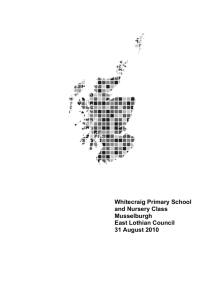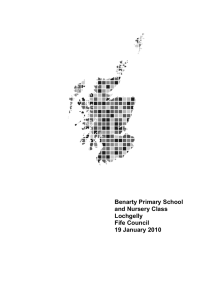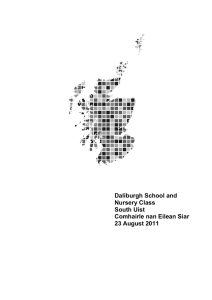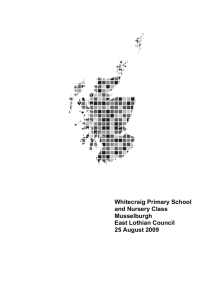Netherburn Primary School and Nursery Class South Lanarkshire Council
advertisement
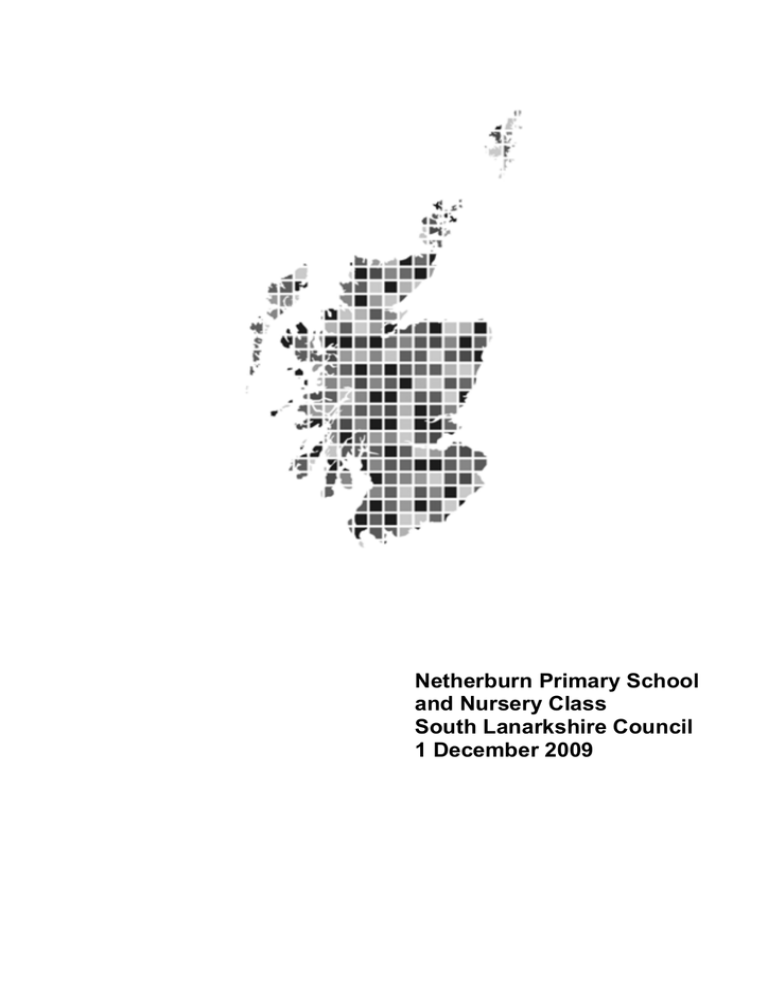
Netherburn Primary School and Nursery Class South Lanarkshire Council 1 December 2009 HM Inspectorate of Education (HMIE) inspects schools in order to let parents1, children and the local community know whether their school2 provides a good education. Inspectors also discuss with school staff how they can improve the quality of education. At the beginning of the inspection, we ask the headteacher and staff about the strengths of the school, what needs to improve, and how they know. We use the information they give us to help us plan what we are going to look at. During the inspection, we go into classes and join other activities in which children are involved. We also gather the views of children, parents, staff and members of the local community. We find their views very helpful and use them together with the other information we have collected to arrive at our view of the quality of education. This report tells you what we found during the inspection and the quality of education in the school. We describe how well children are doing, how good the school is at helping them to learn and how well it cares for them. We comment on how well staff, parents and children work together and how they go about improving the school. We also comment on how well the school works with other groups in the community, including services which support children. Finally, we focus on how well the school is led and how staff help the school achieve its aims. If you would like to learn more about our inspection of the school, please visit www.hmie.gov.uk. Here you can find analyses of questionnaire returns from children, parents and staff. We will not provide questionnaire analyses where the numbers of returns are so small that they could identify individuals. Where applicable, you will also be able to find descriptions of good practice in the school. 1 Throughout this report, the term ‘parents’ should be taken to include foster carers, residential care staff and carers who are relatives or friends. 2 The term ‘school’ includes the nursery class or classes where appropriate. Contents 1. The school 2. Particular strengths of the school 3. Examples of good practice 4. How well do children learn and achieve? 5. How well do staff work with others to support children’s learning? 6. Are staff and children actively involved in improving their school community? 7. Does the school have high expectations of all children? 8. Does the school have a clear sense of direction? 9. What happens next? 1. The school Netherburn Primary School is a non-denominational school with a nursery class. It serves the village of Netherburn, near Larkhall and the surrounding area. The roll was 88, including 24 in the nursery, when the inspection was carried out in October 2009. Children’s attendance was in line with the national average in 2007/2008. 1 2. Particular strengths of the school • Children’s confidence and enthusiasm for learning. • Strong staff teamwork and their commitment to children’s care, welfare and development. • The broad range of experiences across the curriculum to enhance children’s achievements and develop their talents. • Development of active learning. • Innovative leadership of the headteacher and staff in taking forward school improvements. 3. Examples of good practice • Enterprising learning. • French across the nursery and school. 4. How well do children learn and achieve? Learning and achievement Across the school, children are very enthusiastic and well-motivated learners. In the nursery, they are happy and settled and enjoy taking part in a wide range of learning experiences. They are learning to cooperate and take turns. At the primary stages, children have a very positive attitude to their learning. They have many opportunities to 2 lead and take responsibility. They are actively involved in their learning both in and out of class. They are developing a very good understanding of what they are good at and how they can improve. At all stages, children are developing very effective citizenship and enterprise skills. They are achieving a high level of success in helping to improve their school and caring for the environment. The nursery and school have achieved a gold award in health promotion. Children take part enthusiastically and confidently in the wider life of the school. For example, they helped to plan and lead a French day. They benefit from a wide range of out-of-class activities. Older children are developing their leadership skills in helping to lead these activities for younger children. Children are developing their fitness and understanding of leading a healthy lifestyle through the support of the Active Schools coordinator and a wide range of physical activities. At all stages, children are developing very good skills in speaking French. In the nursery, the majority of children listen well in group activities and can follow simple instructions. Most are aware of some letter names and sounds and can recognise their name. The majority can count to ten and are beginning to recognise numbers and shapes when playing games. At the primary stages, most children attain appropriate national levels in listening, talking, reading and mathematics. The majority do so in writing. In recent years, the school has raised standards in reading and is taking appropriate action to improve attainment in writing. At the early stages, most children attain levels earlier than might normally be expected. However, for a few children, this progress is not sustained as they move through the school. Most children talk well and can give informed opinions during group discussions. A few do not always listen sufficiently well. Most children are enthusiastic readers. They read fluently and with expression. The majority of children write well. They should now be given more opportunities to write for a wider range of purposes and audiences and also at length. In mathematics, most children can carry out calculations well and have a good understanding of money and measurement. They know quick ways to calculate mentally. Across the school, children have a good understanding of two- and 3 three-dimensional shape. They can use a range of graphs and charts to display information. Children have a good understanding of problem-solving strategies and can use them in real-life situations. Curriculum and meeting learning needs Staff have made a very good start to developing and implementing aspects of Curriculum for Excellence. Staff are making learning more meaningful and relevant. In the nursery class, staff provide a broad range of play activities and take good account of children’s interests in planning learning. They should now continue as planned, to develop the tracking of children’s progress and achievements. In the primary classes, the curriculum is very well developed. Children benefit from well-planned activities which include learning about enterprise, health, citizenship and sustainability. The school provides all children with two hours of high-quality physical education each week. Across the school, staff know children and their families very well. They provide a very high level of care and support to children. In the nursery, staff are very sensitive to individual children’s needs and interests. They provide a range of activities that are matched to the age and development stage of children. At the primary stages, staff match tasks and activities well to the learning needs of most children. They now need to ensure that for a few children, the pace, depth and level of difficulty of tasks is consistently appropriate. The school is effective in identifying, supporting and monitoring children who need extra help with their learning. Staff work with other professionals to help plan well-targeted support. They consult with parents and children to set appropriate learning targets. As a result, children with additional learning needs are making good progress with their learning. 4 5. How well do staff work with others to support children’s learning? The school has very effective links with parents and the local community. Parents are very positive about the school. The Parent Council and Parents, Friends and Staff Association are very supportive of the school. They work closely with staff to enhance children’s experiences. For example, they raised funds to help buy an interactive white board and new library books. Newsletters provide helpful information to parents about the work of the school. Nursery parents can comment on the work of the nursery through the ‘Netherburn Natter’. Parents are also kept well informed about their children’s progress. Staff consult parents appropriately about all aspects of school life, including sensitive health issues. The school is well supported by the school chaplain. The school provides very helpful open events where parents can learn about the curriculum and how to support their children’s learning. The school deals appropriately with parental concerns and complaints. 6. Are staff and children actively involved in improving their school community? Children are very proud of their school and are very keen to work with staff to help improve it. They feel valued and respected. The pupil council plays a very active part in helping to improve aspects of the school. For example, members planned a recent health event and decided which charities the school should support. Children have many opportunities to take responsibility in the school, for example as buddies, junior road safety officers and on the eco committee. They have also used their own interests and leadership skills to lead lunchtime clubs for other children. Across the school, staff work very well together and are strongly committed to improving the school. Support staff contribute very well to the life and work of the school. The headteacher has a very good understanding of the strengths and areas for development in the school. Staff regularly look closely at their classroom practice and how they can improve children’s 5 experiences. The headteacher engages teachers very well in evaluating their work and in tracking children’s progress. Staff have recently begun ‘Learning Walks’ with groups of children to look for and share good practice across the school. 7. Does the school have high expectations of all children? There is a strong culture of achievement and improvement in the school. Staff set high expectations of children’s achievement and learning. They now need to ensure that expectations of attainment are consistently high. Staff celebrate children’s achievements through assemblies and through class and school awards. Children are friendly, polite and very enthusiastic about their learning. They feel safe, happy and well cared for in school. Staff are clear about their responsibilities for child protection and support children’s personal and social development very well. Effective procedures are in place to deal with any instances of bullying. Children feel they are treated equally and fairly. They have a good understanding of other cultures and faiths and of global issues such as poverty in the world. They are very proud of their support of ‘Fairtrade’. 8. Does the school have a clear sense of direction? The headteacher is a highly-effective leader and is held in very high regard by parents, children and staff. She has worked very effectively with children, staff and parents to share her vision for the school. All staff successfully carry out a range of leadership roles and work very well alongside the headteacher to improve the school. Working with staff and children, the headteacher has focused appropriately on improving children’s learning and has achieved considerable success. She knows the school very well and it is very well placed to keep improving. 6 9. What happens next? As a result of the very good quality of education provided by the school, we will make no further visits in connection with this inspection. The education authority will inform parents about the school's progress as part of the authority’s arrangements for reporting to parents on the quality of its schools. We have agreed the following areas for improvement with the school and education authority. • Continue to raise attainment, particularly in writing, through ensuring appropriate depth and challenge in children’s learning. • Continue to develop the assessment and tracking of children’s progress in the nursery. At the last Care Commission inspection of the nursery class five recommendations were made, all had been addressed. 7 Quality indicators help schools and nursery classes, education authorities and inspectors to judge what is good and what needs to be improved in the work of a school and a nursery class. You can find these quality indicators in the HMIE publications How good is our school? and The Child at the Centre. Following the inspection of each school, the Scottish Government gathers evaluations of three important quality indicators to keep track of how well all Scottish schools and nursery classes are doing. Here are the evaluations for Netherburn Primary School and Nursery Class. Primary school Improvements in performance Learners’ experiences Meeting learning needs good very good good Nursery class Improvements in performance Children’s experiences Meeting learning needs good very good good We also evaluated the following aspects of the work of the school and nursery class. The curriculum Improvement through self-evaluation HM Inspector: Lesley R Brown 1 December 2009 8 very good very good When we write reports, we use the following word scale so that our readers can see clearly what our judgments mean. excellent very good good means means means satisfactory weak unsatisfactory means means means outstanding, sector leading major strengths important strengths with some areas for improvement strengths just outweigh weaknesses important weaknesses major weaknesses If you would like to find out more about our inspections or get an electronic copy of this report, please go to www.hmie.gov.uk. Please contact us if you want to know how to get the report in a different format, for example, in a translation, or if you wish to comment about any aspect of our inspections. You can contact us at HMIEenquiries@hmie.gsi.gov.uk or write to us at BMCT, HM Inspectorate of Education, Denholm House, Almondvale Business Park, Almondvale Way, Livingston EH54 6GA. Text phone users can contact us on 01506 600 236. This is a service for deaf users. Please do not use this number for voice calls as the line will not connect you to a member of staff. You can find our complaints procedure on our website www.hmie.gov.uk or alternatively you can contact our Complaints Manager, at the address above or by telephoning 01506 600259. Where the school has a nursery class, you can contact the Complaints Coordinator, Headquarters, Care Commission, Compass House, Riverside Drive, Dundee DD1 4NY, telephone 0845 603 0890. Crown Copyright 2009 HM Inspectorate of Education.

